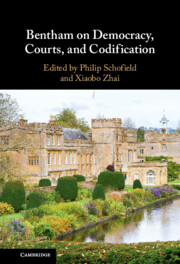Book contents
- Bentham on Democracy, Courts, and Codification
- Bentham on Democracy, Courts, and Codification
- Copyright page
- Contents
- Contributors
- Introduction
- Part I Democracy
- Part II Law and the Courts
- 8 Between Constructivism and Immanentism
- 9 A Genius for Legislation
- 10 Indirect Legislation in Bentham’s Late Constitutional Writings
- 11 Bentham, Courts, and Democracy
- Part III Codification
- Bibliography
- Index
9 - A Genius for Legislation
Bentham’s ‘Art and Science’ of Legislation and Modern Legisprudence
from Part II - Law and the Courts
Published online by Cambridge University Press: 25 August 2022
- Bentham on Democracy, Courts, and Codification
- Bentham on Democracy, Courts, and Codification
- Copyright page
- Contents
- Contributors
- Introduction
- Part I Democracy
- Part II Law and the Courts
- 8 Between Constructivism and Immanentism
- 9 A Genius for Legislation
- 10 Indirect Legislation in Bentham’s Late Constitutional Writings
- 11 Bentham, Courts, and Democracy
- Part III Codification
- Bibliography
- Index
Summary
The neologism ‘legisprudence’ refers to ‘the name for the branch of legal theory that deals with legislation from a theoretical and a practical perspective’.1 In what follows, I will present an analysis of Bentham’s ‘art and science’ of legislation and try to show the relevance of his theory for modern legisprudential concerns. A fundamental problem with this field of study concerns its boundaries and its place within the domain of legal science. This is closely related to the question of whether, and possibly how, legal scholars can contribute to legisprudence rather than leaving it (for instance) to sociologists, political scientists, and other experts. I will try to show that, for Bentham, the ‘art and science of legislation’ was a branch of normative ethics that constituted a completely legitimate and indeed crucial field of research for legal scholars. I will then focus on how Bentham treated the problem of rational law-making and legislative reason-giving, which is central to legisprudence as a ‘rational theory of legislation’.2 Lastly, I confront Bentham’s theory with some of the problems that current legisprudence is addressing and examine – including in light of his late constitutional theory – the kinds of answers, if any, he would provide.
- Type
- Chapter
- Information
- Bentham on Democracy, Courts, and Codification , pp. 214 - 236Publisher: Cambridge University PressPrint publication year: 2022

